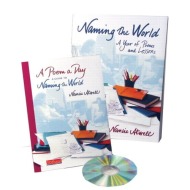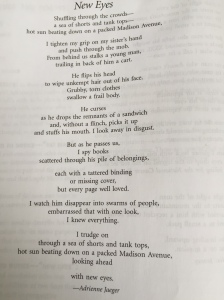Our sixth grade writing workshop year follows a predictable and well planned path: personal narrative, followed by memoir, then feature articles and argument. In between, we attempt mini units such as photo essay and the literary essay. And we bring the year to an end with our multi genre project. That is it: our year of writing.
Until my students suggest something new – which happens just about every year. I love these mini-units best, because they are student inspired and student driven. They are usually tossed off in the way kids seem to have a knack for: spontaneous, excited, without any thought as to time frame or rubrics or (even) know how. Here’s the story of this year’s version…
Thursday is Poetry Day in 202 – we share the poems we’ve “unpacked” for homework: i.e. our thoughts about the way the poet has played with language, white space, and structure to craft a message or create a mood. Our conversations begin with the poems, but veer off into other directions, for poetry inspires us to think and feel and wonder. many of our poems come from this wonderful collection, Nancie Atwell’s Naming the World: A Year of Poems and Lessons:
The student poetry in this collection never fail to excite curiosity and interest in my students. All of them are based on lessons that Nancie centered around iconic poems (Robert Frost, William Carlos Williams, Shakespeare, and Elizabeth Barrett Browning, to name a few) or important themes ( growing up, the senses, the natural world). They are fresh, and real to my sixth graders – accessible poems they can sink their teeth into and imagine themselves in. We love them.
The week before last, we read Adrienne Jaeger’s “New Eyes”:
and last week we read Anna Jaeger’s “Family”:
My kids were struck by the connections between the two poems; what resonated was the idea of looking at old photographs of family members and imagining their lives with “new eyes” – what had they suffered through? what had they imagined? what could we learn from asking questions about their lives? what hidden stories and lessons could we uncover?
And then someone quietly said, as though to herself: “This would be kinda cool to write about.” Indeed. And so a new mini unit is born – Family Stories. Here’s how I imagine it will go:
- We will select a family photograph that intrigues us and talk through the questions it elicits in each of us after a close examination: what details tell a deeper story? what is known of this person? what do we want to know? what questions can we ask this person? who can we talk to if this person is no longer alive?
- We will figure out questions to ask and conduct an interview process to collect facts, stories, family lore.
- We will write narratives based on what we learn, illustrated with actual photographs, maps, old passport photographs, or whatever else we can get our hands on.
- We can go digital with this using Google Presentations or Emaze, perhaps embedding videos of places and using apps like Waterlogue to add painterly effects and Vanilla Pen to create quote posters.
- We can celebrate by inviting our families to share our completed stories.
I can’t wait to begin our new mini unit!





Reblogged this on Aspire to Inspire.
LikeLike
Love this! I did something similar years ago but not to this degree. This is fantastic!
LikeLike
We did a version of this years ago when working with story tellers in our classrooms. The students researched and wrote about an event in their family or a person. We also had a family night but asked parents, grandparents to come and tell us stories from their lives. It was always a powerful writing and telling event. (Our students came from around the world so there were many tales of leaving countries to come to the United States.)
Have fun with this unit!
LikeLike
You should read Search for the Shadowman by Joan Lowry Nixon. It’s a lot like your class project — and I think there’s a photo as part of the story, too.
LikeLike
Tara, it is serendipitous that I am writing a family story for Day 24 in the form of a poem while you are showcasing your piece that I happen to really like for the flow of ideas, the structure of the piece, and the engaging style. I am always eager to get another take on an idea that I have tried in a different manner. Thabk you.
LikeLike
I love this!!! This is so important to keep our storytelling skills alive. I am so grateful for the time I had with my momma, grandma, and daddy sharing their stories with me. I think it is SO essentail for our youth to be exposed to this experience. Thank you!!!!
LikeLike
I love how you have a plan but the students derail it. I don’t know why am always amazed at how creative kids are but sadly I am.
LikeLike
Your students will likely shine with this project as it came from their own idea. My students usually do better when they have helped to craft the lesson. Look forward to hearing the results.
LikeLike
I love the flow of your year and the kid inspired mini lessons in between. Can’t wait to read some of your kids’ stories. Thanks for sharing.
LikeLike
I hope you share some of the writing your kids will do during this unit with us. It looks like it will be fascinating!
LikeLike
I just checked out these books, wow! I want a set. I want to try these ideas with the kids. Thank you for sharing.
LikeLike
Love these ideas! Thank you for sharing!!!
LikeLike
Great ideas …
LikeLike
Reblogged this on Great Mentor Texts and commented:
I love this use of poems to spark a unit on Family.
LikeLike